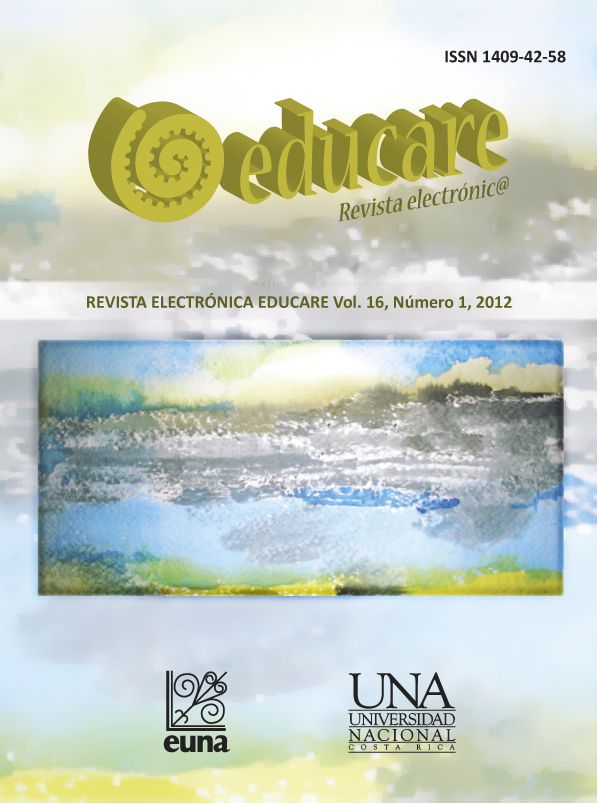Linkage: Basic Requirement in any Product of Research in Education
DOI:
https://doi.org/10.15359/ree.16-1.1Keywords:
Linkage, educational research, epistemology, academic writing, methodologyAbstract
The scientific production, in the field of education, constantly refers to linkage as a special condition to develop research. However, its meaning and the way to achieve that condition are not always clear, particularly for those who are in a training stage of research in education. Meanwhile, the academic production reviewers consider linkage as a very important aspect and essential characteristic of any research project. This paper suggests that linkage involves an epistemological discussion on the research factors in each one of the research stages, such as the construction of the object of study, the definition of methodology, and the data analysis and interpretation, among the most important stages. Linkage takes shape in a written product showing the results from an orderly construction and communication of thought, according to the rules established in a particular field of knowledge.
References
Bachelard, G. (1978). La formación del espíritu científico. Contribución a un psicoanálisis del conocimiento objetivo. México: Siglo XXI.
Bourdieu, P., Chamboredon, J.-C. y Passeron, J.-C. (1975). El oficio del sociólogo. Presupuestos epistemológicos. México: Siglo XXI. Cassany, D. y Morales, O. A. (enero-diciembre, 2008). Leer y escribir en la universidad: Hacia la lectura y la escritura crítica de géneros científicos. Memoralia, 5, 69-82, Recuperado de http://www.falemosportugues.com/pdf/leer_universidad.pdf
Cervantes, C. (1997, mayo-agosto). Problematizar la “articulación” como recurso metodológico utilizado en el campo académico de la comunicación en México. Comunicación y
Sociedad, 30, 79-99. Recuperado de http://www.publicaciones.cucsh.udg.mx/pperiod/comsoc/
pdf/30_1997/79-99.pdf
Coffey, A. y Atkinson, P. (2003). Encontrar el sentido a los datos cualitativos. Estrategias complementarias de investigación. Colombia: Universidad de Antioquia.
Foucault, M. (1973). El orden del discurso. Buenos Aires: Tusquets.
Kalman, J. (septiembre, 2000). La importancia del contexto. Conferencia magistral presentada en el Día Internacional de la Alfabetización llevado a cabo en Morelia, Michoacán, México.
Kerlinger, F. y Lee, H. (2001). Investigación del comportamiento: Métodos de investigación en ciencias sociales. México: McGraw-Hill.
Narvaja de Arnoux, E., Di Stéfano, M. y Pereira, C. (2002). La lectura y la escritura en la universidad. Buenos Aires: Eudeba.
Ponce, H., Iglesias, R. y Castillo, R. (2009). Estrategia metodológica para desarrollar proyectos de investigación en ciencias sociales. Recuperado de http://www.eumed.net/rev/cccss/06/tab.htm
Potter, J. (1998). Crítica de hechos. En J. Potter (Aut.). La representación de la realidad. Discurso, retórica y construcción social (pp. 255-292). Barcelona: Paidós.
Rodríguez, C., Lorenzo, O. y Herrera, L. (2005, julio-diciembre). Teoría y práctica del análisis de datos cualitativos. Proceso general y criterios de calidad. Revista Internacional de Ciencias
Sociales y Humanidades SOCIOTAM, 15(2), 133-154.
Stierer, B. y Antoniou, M. (2004, julio). Are there Distinctive Methodologies for Pedagogic Research in Higher Education? [¿Existen metodologías distintivas para la investigación pedagógica en educación superior?]. Teaching in Higher Education, 9(3), 275-285.
Zanotto, M. (2007). Estrategias de lectura en lectores expertos para la producción de textos académicos (Tesis doctoral). Departamento de psicología básica, evolutiva y de la educación,
Universidad Autónoma de Barcelona, Recuperada de http://www.tesisenred.net/bitstream/
handle/10803/4759/mzg1de1.pdf?sequence=1
Downloads
Published
How to Cite
Issue
Section
License
1. In case the submitted paper is accepted for publication, the author(s) FREELY, COSTLESS, EXCLUSIVELY AND FOR AN INDEFINITE TERM transfer copyrights and patrimonial rights to Universidad Nacional (UNA, Costa Rica). For more details check the Originality Statement and Copyright Transfer Agreement
2. REUTILIZATION RIGHTS: UNA authorizes authors to use, for any purpose (among them selfarchiving or autoarchiving) and to publish in the Internet in any electronic site, the paper´'s final version, both approved and published (post print), as long as it is done with a non commercial purpose, does not generate derivates without previous consentment and recognizes both publisher's name and authorship.
3. The submission and possible publication of the paper in the Educare Electronic Journal is ruled by the Journal’s editorial policies, the institutional rules of Universidad Nacional and the laws of the Republic of Costa Rica. Additionally, any possible difference of opinion or future dispute shall be settled in accordance with the mechanisms of Alternative Dispute Resolution and the Costa Rican Jurisdiction.
4. In all cases, it is understood that the opinions issued are those of the authors and do not necessarily reflect the position and opinion of Educare, CIDE or Universidad Nacional, Costa Rica. It is also understood that, in the exercise of academic freedom, the authors have carried out a rogorous scientific-academic process of research, reflection and argumentation thar lays within the thematic scope of interest of the Journal.
5. The papers published by Educare Electronic Journal use a Creative Commons License:















 The articles published by Educare Electronic Journal can be shared with a Creative Commons License:
The articles published by Educare Electronic Journal can be shared with a Creative Commons License: 



